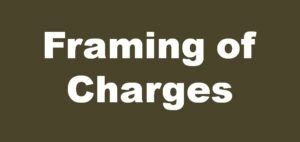Framing of Charges by Magistrate and Its Legal Analysis

Framing of Charges
The stage of framing of charges comes after filing of charge sheet by police.
Framing of charges is the crucial stage in which Magistrate evaluate the evidences before preparing imputations against accused.
Object of Framing Charges
The object of framing charge against an accused person in a criminal trial is to make him aware of charges.
Object of clearly explaining to him the main facts sought to be established against him by the prosecution or the complainant so that he may have a full and fair chance to defend himself at the trial.
Contents of charges
The charges contains name, designation of the Magistrate framing of charges. The charges charge clearing mention the following details of accused:-
(a) Name of accused.
(b) Date, time and place of incident
(c) Particulars of Victims
(d) Relevant Penal Section of IPC/BNS/Special Act
(e) Expression of the Accused claiming trial, etc.
Scrutiny of Evidence by Magistrate
The trial court can consider only the police investigation report filed under section 193 of BNSS and documents annexed therewith.
The Magistrate has to consider only the police report while making the accused aware of the charges.
Magistrate would reject submission of the accused while preparing charges.
Discharge of Accused on inconsistencies of Evidence
Normally Magistrate may discharge an accused on the ground of inconsistencies of evidences, however, the Hon’ble Supreme Court held that Magistrate should do such exercise while prosecution of evidence.
Discharging an accused due to inconsistencies of evidences is not proper and amendable under revision jurisdiction.
Hearing of Accused and Prosecution before Framing of Charges
Magistrate would hear the both accused and prosecution before preparing charges. Trial court must give opportunity to prosecution and the accused before finalizing charges and discharging the accused.
An accused can present his innocence by himself or through an criminal advocate while Magistrate gives opportunity of Hearing. The latest criminal matter judgments would always help to apprise the Trial Court.
Reasoned Order is Mandatory to Discharge the Accused
Magistrate can frame the Charges without recording reasoned Order; however, reasoned Order is mandatory before discharging an accused.
If the Magistrate makes an Order of discharge of an accused without recording reasoned Order, the revisional Court may set aside or remand back to pass reasoned Order.
The experience advocates in Delhi advises whether the order need to be challenged before Apex Court or not.
Frequently Asked Questions
Whether an accused should get copy of police charge sheet before framing of charges ?
Yes, under section 230 of the BNSS, the Magistrate should supply the copy of charge sheet and other relevant documents before framing charges otherwise order is not proper.
What is the remedy for an accused after framing of charges by Magistrate ?
The accused can file revision petition before Session Judge against Magistrate’s Order.
Can a single accused be charged for section 61(2) BNS (Earlier 120-B IPC) ?
No, single accused cannot be charged for criminal conspiracy under section 61(2) BNS (Reference : Vinayak Vs. State of Maharashtra, 1984 SCC (Criminal) 605.
Can Magistrate withdraw the charges framed against an accused ?
No, once charged has been framed by Magistrate, the same cannot be withdrawn under section 239(1) BNSS.
Can Magistrate alter the charges framed against an accused ?
Yes, Magistrate can alter the charges framed against the accused because section 239(1) BNSS empowers the Court to alter the charges before pronouncement of the Judgment.
Can Magistrate discharge an accused after framing the charges ?
No, Magistrate cannot discharge an accused after framing the charges ( Reference : Rati Lal Vs. State of Maharashtra, AIR 1979 SC 94.
Can Magistrate discharge any accused for the offences triable by Session Court ?
Magistrate cannot discharge an accused u/s 268(1) BNSS if the case is triable by court of sessions.
